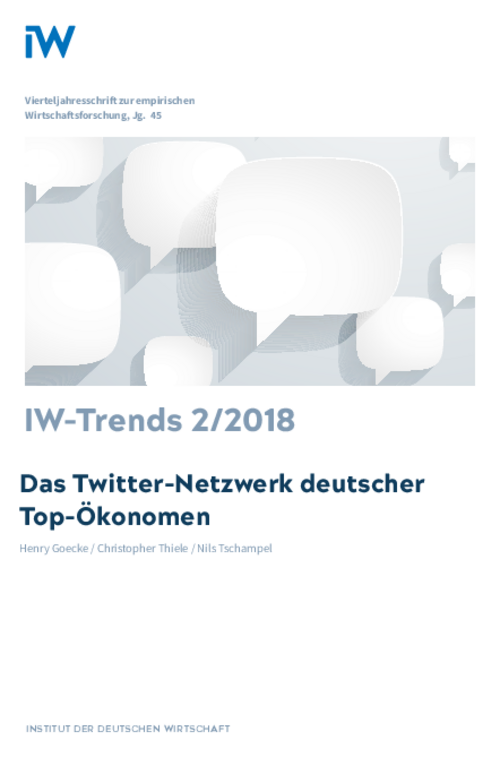The importance of social media is increasing rapidly, and with it their relevance as a potential communication channel for economists. On the one hand, taking the example of the microblogging service Twitter, it is possible to analyse how top German economists use social media to inform society on political and economic issues, debates and opinions. On the other hand, the network of links between the economists themselves is also of interest, as it creates a space for scientific exchange and discourse.

Social Media: The Twitter Network of Top German Economists
IW-Trends

The importance of social media is increasing rapidly, and with it their relevance as a potential communication channel for economists. On the one hand, taking the example of the microblogging service Twitter, it is possible to analyse how top German economists use social media to inform society on political and economic issues, debates and opinions. On the other hand, the network of links between the economists themselves is also of interest, as it creates a space for scientific exchange and discourse.
The article evaluates the pattern of links in a Twitter network based on two criteria: the number of people who follow a given economist (followers) and the number of messages forwarded to other users (retweets). This analysis of the Twitter network of top German economists, measured by both followers and retweets, shows that most of them are relatively well connected. Overall, Twitter has opened up a potential space for academic communication among economists. It also shows that a very high pro - portion of the retweets of their contributions originate from people outside the economists’ network. Germany’s top economists obviously have an influence on the socioeconomic discourse.

Henry Goecke / Christopher Thiele / Nils Tschampel: Das Twitter-Netzwerk deutscher Top-Ökonomen
IW-Trends

More on the topic

Data Utilisation and Data Sharing: The Potential and the Reality in German Companies
Companies that store their data extensively in digital form, process it in a structured manner and use it in a variety of ways can become particularly efficient members of the data economy.
IW
Intellectual property and fourth industrial revolution technologies: how the patent system is shaping the future in the data-driven economy
Using the classification system from the European Patent Office (EPO), we identify almost 600,000 patent applications for fourth industrial revolution technologies from 1986 to 2015.
IW